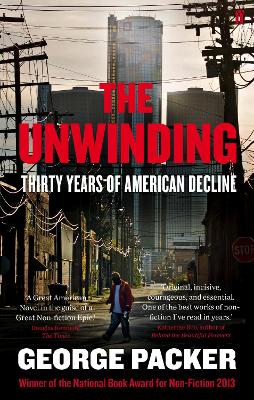
America is in crisis. In the space of a generation, it has become more than ever a country of winners and losers, as industries have failed, institutions have disappeared and the country's focus has shifted to idolise celebrity and wealth.
George Packer narrates the story of America over the past three decades, bringing to the task his empathy with people facing difficult challenges, his sharp eye for detail and a gift for weaving together engaging narratives.
The Unwinding moves deftly back and forth through the lives of its people, including Dean Price, the son of tobacco farmers who becomes an evangelist for a new economy in the rural South; Tammy Thomas, a factory worker in the industrial Midwest attempting to survive the collapse of her city; Jeff Connaughton, a political careerist in Washington; and Peter Thiel, a Silicon Valley billionaire. Their stories are interspersed with biographical sketches of the era's leading public figures, from Oprah Winfrey to Steve Jobs, to create a rich, wise and very human portrait of the USA in these hard times.
The Unwinding portrays a superpower coming apart at the seams, its elites and institutions no longer working, leaving ordinary people to improvise their own schemes for salvation.
George Packer is also the author of The Assassin's Gate, which was named one of the ten best books of 2005 by the New York Times and won the Helen Bernstein Book Award.
'A tour de force . . . A fascinating journey through an America that has largely remained hidden from view. There are echoes of Don DeLillo's Underworld in the scope of Packer's vision and his deft eye for language and detail.' Sunday Business Post
This did not get off on the right foot with me. It started off in Stokes County, where I know every road and place he names because I was born and raised one county over and have lived here my whole life. When the tone got under my skin in record time— condescension, cliches, the usual— I went to the non-Stokes chapters, and they were worse.
I just can’t do that subtle NPR signaling of “us” and “them” without any attempt at real understanding. Sorry. I’m one of the “them,” and there are too many writers that do justice to the complexities, hypocrisies, and plight of the region to put up with the ones full of their own agenda. This book exists to reinforce the echo chambers, and I don’t want any part of it.
I’m not sure whether it was better or worse than Hillbilly Elegy, though, so there’s that.
Reading updates
-
Started reading
-
Finished reading
-
30 January, 2017:
Reviewed
